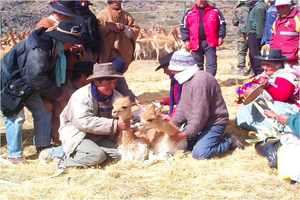Mission Matters
A lesson from the vicuña
God's mission takes 'every hand'
Dear colleague in ministry,
Whereas western society values “rugged individualism,” Andean indigenous communities tend to think and act more collectively—like the various members of one body.During the decade that my family and I lived in Peru, I had the privilege of spending several months in thecomunidad indígena of Santa Barbara, an Andean community of about 400 families located at an elevation of 14,000 feet. The Presbyterian churches and “preaching points” in that community grew significantly during the years of the political violence that pitted the Peruvian Army against the Shining Path Liberation Army because Presbyterian churches functioned as true sanctuaries where many traumatized people found a place where they could lament their loss, find comfort, and begin to make sense of the unspeakable violence of those years.

Vicuña roundup in Peru
One bitterly cold morning in 2006, I participated in a beautiful custom in Santa Barbara that took place when a herd of vicuña(the graceful relatives of the Andean llama) wandered down into the community from their high-altitude habitat. In order to round up the vicuña and harvest some of their valuable wool, the community arose well before sunrise, joined hands and slowly walked up the side of a steep hill to gather the vicuña herd into a fenced corral. After these beautiful, untamed animals were calmed, the wool of several of them was sheared and they were released. The Santa Barbara community believes that tukuy maki (“every hand”) is needed for this important mission. If a child is sick or an expectant mother is about to give birth and cannot participate in the rigorous climb to the round-up in the high meadow, they send along a prenda—a handkerchief or some other personal item that symbolizes that the community engages in its mission with their blessing. There’s a widespread belief that, without the blessing of every hand, the mission cannot be a success.
I think the people of Santa Barbara are onto something: in an age where our culture’s value of “rugged individualism” can grow to become self-centeredness, fragmentation and disunity, many U.S. Presbyterians today engage in God’s mission on their own. They travel with “their money,” on “their time” to do “their mission,” as one mission leader told me last summer. But Scripture reminds us that it is God’s mission, not ours, and that we are graciously invited to join in that mission as God’s people, not as “lone rangers” (the Great Commission in Matthew 28:18-20 is a plural command, addressed to all God’s people).
U.S. Presbyterians are gathering together in the Syria/Lebanon Partnership Network to support beleaguered Syrian Presbyterians and help them care for their suffering neighbors. Syrian Presbyterians are educating Christian and Muslim children together and need our help to continue to do so. There has been an outcry across our country by Presbyterians who want to help resettle Syrian and other refugees. Yet ministries like disaster relief, rehabilitation and community development, refugee resettlement, primary education and long-term support for the local churches is best carried out when we work together.
If your congregation is working alone in God’s vineyard, I hope you’ll consider increasing your impact by collaborating with other Presbyterians in more than 30 networks that focus the experience, wisdom and commitment of U.S. Presbyterians and our global partner church leaders on the deeper needs of the people. This is why God calls us together in mission.
The good news is—this is what we were made for!
Click here to go back to the main Mission Matters page.


